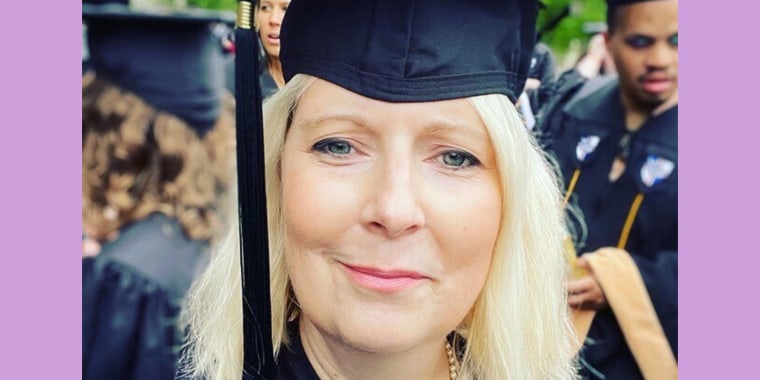Angela Carpenter Gildner, 55, is a social worker in Washington, D.C. When her son was diagnosed with ADHD, she suspected that she also had the condition and was later diagnosed with it. She shares with TODAY.com what it’s like being diagnosed with ADHD as an adult.
When I was growing up, few people talked about ADHD, and certainly no one considered girls could have it. For years, experts thought that ADHD affected only boys — bundles of energy who bounce off walls and struggle to pay attention in school, which disrupted their peers and led to poor grades. We now know that it impacts girls and women, but it simply looks different.
When my son was in the second grade, he was diagnosed with ADHD. As I learned more about it, I started seeing those traits in myself. I’m hyper-focused on things that I love, just like he is. That served me well when I worked as an art director at a magazine. I thrived when designing layouts while racing against tight deadlines. But when I started graduate school to become a social worker, I found studying and some of the work felt harder for me. As part of my classes, I was learning about ADHD and there was a self-evaluation for it. Since I suspected I had ADHD, I filled one out and felt surprised by how many ADHD traits I had. I ticked almost every box. At an appointment with my son's doctor, I mentioned how I suspected that I had ADHD, too, and she recommended a doctor who treated adults. I was lucky. Many adults struggle to find a doctor and to receive a timely diagnosis. Often, they go through extensive testing before a doctor tells them they have ADHD. My new doctor trusted my self-reporting, and didn’t make me jump through hoops. She listened to me and believed me, noting that I had classic ADHD and prescribed me medications to manage my symptoms.
After I received a diagnosis, many of my behaviors started making sense. When I was in school, teachers often called me a “motor mouth” because I was super chatty about things I love. I remember a comment on a report card that said, “Angela is always willing to share her experiences with the class.” In school, my hand shot into the air any time a teacher asked a question because I was always ready to talk. I didn’t realize this was characteristic of ADHD in girls until I was a properly medicated adult in graduate school. Then I finally understood that neurotypical people have just as many thoughts and ideas as I did — they simply do not share them ad nauseum. All these years, I thought other people didn’t talk much because they didn’t have a lot of experiences to add to a conversation or they were boring. I had no idea they did not feel compelled to share everything they were thinking like I did.
I also realized my tendency to volunteer to organize too many things is related to my ADHD. If I’m in charge that means I won’t forget, I won’t be late, and I will feel engaged. Tardiness has been a problem in my life. Like others with ADHD, I experience time blindness, meaning I am unaware of time. Most people think I’m just perpetually late, but I don’t have a good sense of how long something takes. If I’m engrossed in a task, I think I’ve only spent five minutes working on it. But when I look at the clock, it could actually be as many as 90 minutes. I also face troubles with my executive functioning, which means that even cooking can be tough because my brain doesn’t understand how to order tasks to finish a recipe. My concept of object permanence is somewhat lacking, too, and if I don’t see something, I forget about it.
Learning I had ADHD felt validating. I felt relief knowing someone believed me that all these various behaviors were a sign of something bigger. Having a diagnosis also allowed me to give myself some grace. Understanding that I do not have to beat myself up for being time blind or struggling with executive functioning makes me feel better about me.
Knowing that I have ADHD also has helped me tweak some things in my life to make it easier. For example, I only go shopping on slow days, so I don’t get too overwhelmed by too many people and stimuli. And if I do begin feeling like it’s too much, I might cut my shopping trip short and not visit all stores I hoped to. I’ve also hired a cleaning person because I realized I am an all-or-nothing type of person when it comes to housework, and I so often do not want to clean everything.
So often, women, not girls, are diagnosed with ADHD because of lingering stereotypes about the condition. Even when girls get an ADHD diagnosis, they might not receive the accommodations and supports they need to succeed. When you’re a newly diagnosed adult it can be even harder to find the experts who can help you. It can feel like a battle even to get a correct diagnosis, which can lead to feelings of isolation, frustration and loneliness. That’s why I want to share my story to offer my encouragement to others who are struggling. It is possible to receive a correct diagnosis and receive treatment and support as an adult with ADHD.
